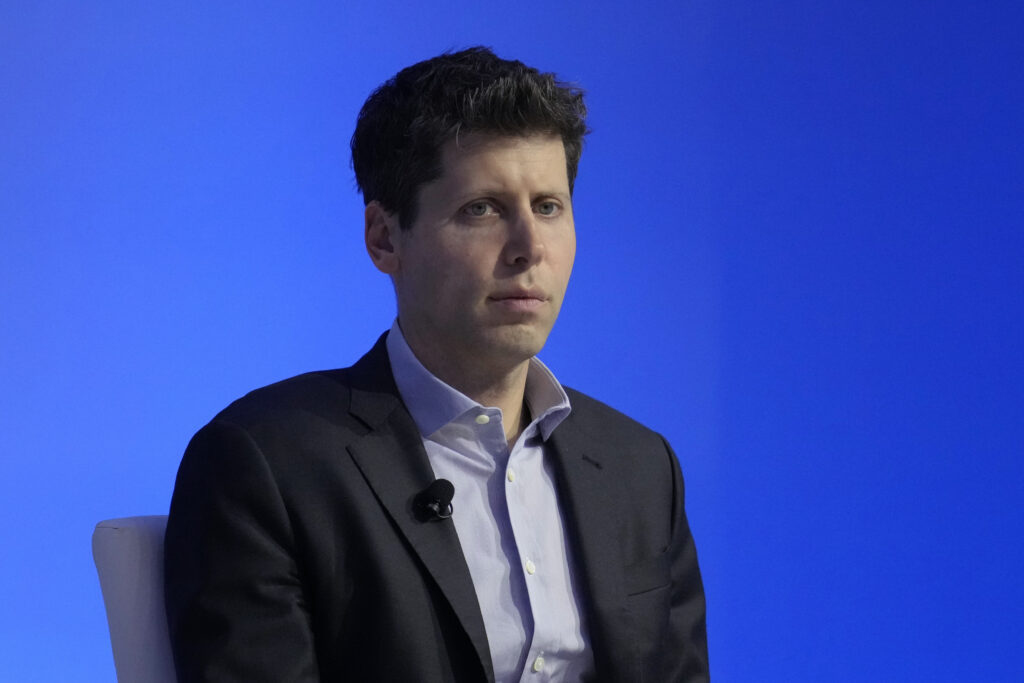Kissinger, Asian and OpenAI
During martial law in the Philippines, it was a standard news image. Uncle Sam was burned in effigy.
But Uncle Sam was the myth. The ideas and thoughts, the “software,” behind U.S. foreign policy were all Henry Kissinger, the American enabler, who under Nixon and Ford from 1969-1977 shaped the neo-conservative framework for Reagan and Bush who continued the Marcos puppetry.
Kissinger died last week at age 100, and it’s amazing how he shaped Asia and Asian America.
Asian Americans can be blunt about Henry Kissinger.

On Capitol Hill in Washington in 2015, members of anti-war group Code Pink called former Secretary of State Henry Kissinger a war criminal. AP Photo/J. Scott Applewhite
The fight against communist insurgents in Mindanao gave Marcos the justification for martial law. But it was with the blessing of the United States, which ironically harbored martial law’s most ardent critics.
But the Philippines was the good example. Kissinger carpet-bombed Cambodia. He napalmed the hell out of Vietnam, a war that he should be pilloried for extending rather than praised for ending. But in a depraved war mongering world, it got him a Nobel Peace Prize.
War criminal
Then there was the war in East Pakistan, and the U.S. backed the military government of West Pakistan in the genocide of what would become Bangladesh.
AAPIs who survived Kissinger’s dastardly deeds were able to seek refuge in America, the consolation for having our homelands destroyed. That’s the positive spin on the man who warranted an obit with the headline last week, “Henry Kissinger, War Criminal Beloved by America’s Ruling Class, Finally Dies.” (Rolling Stone).
What I find more astonishing about Kissinger’s life is how at 100, he wasn’t done. Not only was he looking for relevance by traveling to China to be courted by China’s president Xi Jinping (Kissinger was behind Nixon’s opening up of China in the ‘70s), but NBC news also reported how Kissinger was actively writing and speaking about artificial intelligence (AI).
Of course, the man who knew a thing or two about doomsday scenarios would be fascinated by the thought of a machine being more diabolical than any human. Perhaps he was envious of the possibility of a robot creating more global mayhem than he ever could and wanted in on it. He was, after all, the real deal, a monstrous human.
Alas, he was still just human, and even the worst of us die.
But AI lives on as do the prospects of true existential dread.
And if a demon like Kissinger was worried about AI, so should we.
The path has been chosen for artificial intelligence
Just before Thanksgiving, to paraphrase the poet Robert Frost, in the world of AI, two roads diverged in a yellow wood, and the key developers took the riskiest choice. Caution? No, the green lights are on for AI.
There’s been much reportage on this, but maybe you missed it. Given wars that could become world wars, local concerns about law and order, garden variety racism and discrimination, impending holiday travel and the like, you probably didn’t pay that much attention to a tech billionaire named Sam Altman getting fired last week by his company’s board of directors.

OpenAI CEO Sam Altman was fired then quickly reinstated after workers protested. AP Photo/Eric Risberg, File
Or how the story snowballed. The fired Altman was suddenly hired by another major competitor, which caused headaches for the firing company as workers threatened a revolt, and outsiders speculated as to the impact of the fall of a major tech company on the Bay Area.
The firing company, OpenAI, did what any capitalist enterprise worth its billions would do. It dumped the board members that wanted Altman out, reconstituted a new board of yes-folks, rehired the fired billionaire and all is back to normal.
We are back on a collision course with our own humanity.
OpenAI is the leading company in artificial intelligence. It essentially creates computers that are now or will be smarter than we are. Altman was a “full-speed ahead” guy who wanted to transform the world, creating machines that are so smart, the world could be a better place.
Think about going to your doctor, who may know some things but not all. He makes mistakes and can even forget your name. But with AI capability he puts information about your symptoms into a computer so smart, your diagnosis comes out in seconds. You are cured, hooray, AI.
New world of AI
Consider this result in everything in life; a machine or a robot so smart it has answers to anything beyond words. It can see the sewing patterns in a garment. It can produce an image or likeness on video that replicates a real person. (Is it Lea Salonga? Or a deepfake AI Lea?) This is the new world of AI where machines come up with the answer that replaces humans–if not your life, then your livelihood. That means you and your job. The actors union was concerned about this during its strike. It won more money. But the union couldn’t stop the technology.
So that’s AI in a nutshell. It’s the ultimate in tech disruption. Computers and robots, becoming smarter than any human.
But that means, just as there’s room for good, there is equal opportunity for the opposite—evil.
What if artificial intelligence can be so good, it can do whatever the bad guys are capable of doing? This is not sci-fi. Unregulated, a machine can be so smart it can bypass humans and make the wrong moral choice.
And that’s it for mankind.
We aren’t there yet, but we’re close when Altman was rehired by OpenAI to let the technology spread and enrich all those who can control it.
The more reserved, go-slow types lost like OpenAI’s chief scientist, Ilya Sutskever, Helen Toner, a director of strategy at Georgetown University’s Cetner for Security and Emerging Technology, and Tasha McCauley, a researcher at the Rand Corporation, were let go like outdated Palm Pilots.
They were replaced by hand-picked tech “yes people,” and a big name, Lawrence H. Summers, an economist, former Harvard University President, and former Treasury Secretary in the Obama years.
Notice they didn’t name a Filipino American writer who is an early adopter, but displays cautious prudence. Nor did I see any BIPOC folks on the board.
OpenAI named its own gatekeepers to do whatever it wants in the name of capitalism. And you know how well that strategy has worked out if you’re in the 99 percent.
Why we need AI regulation
Someone needs to regulate this and put a signpost that sets the speed limit at 65 mph or something. At this point, there are no guardrails or radar guns to ticket the tech folks. Congress? At every hearing Congress doesn’t even appear smart enough to regulate TikTok, Facebook, Instagram or X.
This is how we’re going into this new world. Pay attention or get left out and replaced by a machine. There are already predictions of when technologists will reach “singularity,” or the time when machines can no longer be monitored by humans.
Estimates have been put at 5 to 50 years before “singularity.” But some say sooner.
Just yesterday, Jensen Huang, the CEO of Nvidia, the chip maker that is one of AI’s biggest enablers, said it will be 10 years before computers achieve “artificial general intelligence.” That’s the point where computers can pretty much break down multi-step tasks just like humans do.
Speaking at a New York Times/Deal Book Summit (yes, the same one where Elon Musk told advertisers to “Go F*** Yourself,”) Huang joked that he likes how the AI biz puts him in a state where he or the world might “perish.”
That day may be closer than we think. Reports last week said the firing and rehiring of Altman was due to disagreements over a breakthrough. A secret algorithm called Q-star solved some grade school math problems that indicated the machine’s growing ability to use logic in a way that could replace humans.
With that ability, AI could lead to the displacement of up to 47 percent of jobs by 2034.
Forget global warming. Consider computers heating up and replacing mankind.
We’re not just talking about a digital divide, where some people have fast wi-fi connections and others do not. We are talking about digital elimination, a true existential dilemma.
That’s why you need to pay attention to AI developments and make sure that people of color are on boards that help regulate whatever the tech folks devise as benign scientific breakthroughs.
They are not benign. AI can transform the world but are we—you and me–part of it?
But OpenAI works in secret, just like Kissinger did in his diplomatic missions. No wonder Kissinger at 100 was fascinated by AI. But now he’s dead, and the artificial monster and the dread it can create lives on.
Look, I’m no boomer Luddite. I’ve even asked OpenAI’s Chat GPT to write an introduction for me recently that I would give to someone to bring me on stage.
It produced an astonishing intro, calling me “a celebrated journalist” whose “groundbreaking work” has “not only earned him accolades but sparked important conversations about race, identity and social justice.”
My mother would have blushed. And she’s dead.
Frankly, I couldn’t have written it better. It could have replaced me.
But it lacked humility and humanity.
And that’s what’s at stake if we succumb to all the temptations of AI.
Emil Guillermo is a journalist and commentator. He writes a column for Inquirer.net’s US Channel. His “Emil Amok’s Takeout” is on YouTube.com/@emilamok1

